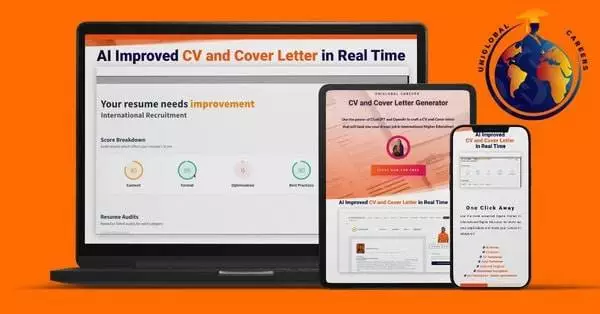If you are interested in pursuing a career in international higher education, there are numerous opportunities available to you. However, breaking into this industry may seem like a daunting task. This article will provide you with the essential information you need to know to land a job in this field. We will explore the international higher education landscape, discuss potential career paths, and guide you through the job search process.
Understanding the International Higher Education Landscape
Before delving into career possibilities, it is important to understand the broader context of international higher education. The field is constantly evolving and impacted by global trends and challenges.
The history of international higher education dates back to the medieval period, when universities in Europe began to attract students from other parts of the world. Today, the landscape of international higher education is more complex, with a diverse range of institutions and organizations involved in the field.
Key Players in International Higher Education
There are several key players in international higher education. These include universities, government agencies, non-profit organizations, and private companies. Each of these has a unique role to play in internationalizing higher education.
Universities are at the forefront of international higher education, with many institutions actively seeking to attract international students and faculty. Government agencies also play an important role, providing funding and support for international education initiatives. Non-profit organizations such as the Institute of International Education (IIE) and the Fulbright Program also contribute to the internationalization of higher education through scholarships, fellowships, and exchange programs. Private companies, particularly those in the technology sector, are increasingly involved in international higher education, providing digital tools and platforms to facilitate learning and collaboration across borders.
Global Trends and Challenges in Higher Education
Globalization has had a significant impact on higher education, leading to worldwide competition for students, researchers, and funding. Additionally, there are challenges such as rising student debt, decreasing public funding for higher education, and ensuring quality education in a rapidly changing digital landscape.
The increasing demand for higher education has led to a rise in online learning, with many institutions offering courses and degree programs that can be completed entirely online. This has created new opportunities for students who may not have access to traditional higher education due to financial or geographical constraints.
However, the shift towards online learning has also raised concerns about the quality of education being offered and the potential for cheating and plagiarism. Institutions must ensure that online courses and degree programs are rigorous and of the same caliber as traditional in-person programs.
The Impact of Technology on International Higher Education
The use of technology in higher education is growing at a rapid pace. Digital tools are now used to offer online courses, provide virtual exchange programs, and facilitate international collaboration between institutions. This trend opens up new opportunities in the field of international higher education.
Virtual exchange programs, for example, allow students to interact with peers from around the world without leaving their home institutions. This provides a cost-effective way for students to gain international experience and develop cross-cultural competencies.
Technology also enables institutions to collaborate on research projects and share resources, regardless of geographical location. This has the potential to accelerate the pace of innovation and discovery in fields such as science, technology, engineering, and mathematics (STEM).
However, the use of technology in international higher education also raises concerns about data privacy and security. Institutions must ensure that sensitive information is protected and that students and faculty are trained in best practices for online safety and security.
Identifying Your Career Path in International Higher Education

There are several potential career paths in international higher education. These depend on your skillset, interests, and level of experience. Pursuing a career in international higher education can be rewarding and fulfilling, as it offers opportunities to work with diverse populations and make a positive impact on the global community.
Academic Roles and Opportunities
Academic roles in international higher education include teaching positions, research positions, and academic administration. These positions require advanced degrees and often involve international travel and collaboration. As a professor, you would have the opportunity to teach courses to students from all over the world, and engage in research projects that address global issues. Academic administrators work to manage and improve academic programs, and may also be involved in recruiting and supporting international students.
Administrative and Support Roles
Administrative and support roles include positions in student services, international admissions, and program management. These positions may require relevant experience or certifications. As a student services coordinator, you would work to support international students during their time at university, providing resources and assistance to help them succeed. International admissions officers work to recruit and enroll international students, and program managers oversee study abroad programs and other international initiatives.
Research and Policy Positions
Research and policy positions are available with government agencies, non-profit organizations, and universities. These positions involve conducting research and providing policy recommendations on issues related to international higher education. As a researcher, you may study topics such as international student mobility, the impact of study abroad programs, or the effectiveness of policies aimed at increasing access to higher education. Policy analysts work to develop and implement policies that promote international education and cultural exchange.
International Student Recruitment and Services
This area involves recruiting and supporting international students who are studying at universities. These positions may require travel and excellent communication and interpersonal skills. As an international student recruiter, you would work to attract talented students from around the world to study at your institution. Once they arrive, you would provide support and resources to help them adjust to life in a new country, including assistance with visas, housing, and cultural adjustment.
Overall, there are many exciting and rewarding career paths in international higher education. Whether you are interested in teaching, research, administration, or policy, there are opportunities to make a positive impact on the global community and help shape the future of education.
Building Your Qualifications and Skills
To increase your chances of securing a job in international higher education, you must build your qualifications and skills. It is a highly competitive field, and having the right qualifications and skills is crucial.
International higher education is a field that requires a lot of knowledge and expertise. It is essential to have the right degrees and certifications to be considered for academic and administrative positions. Advanced degrees in relevant fields such as education, public administration, or international relations are essential. Certifications such as TESOL or TEFL are essential for those interested in teaching English abroad. These degrees and certifications demonstrate your knowledge and expertise in the field and make you a strong candidate for the job.

However, having the right degrees and certifications is not enough. You also need to have relevant experience to be considered for a job in international higher education. Relevant experience can be gained through internships, volunteer work, or entry-level positions in universities or organizations. It is also essential to gain relevant international experience by studying abroad or traveling internationally. This experience will help you understand different cultures and ways of thinking, which is essential in international higher education.
Networking and joining professional associations such as NAFSA and EAIE can help you gain insights and connections in the field. These associations provide opportunities to meet other professionals in the field and learn about the latest trends and developments. They also offer training and professional development opportunities that can help you build your skills and knowledge.
Finally, it is essential to develop language skills and cultural competency to succeed in international higher education. Knowing a second language is a huge advantage in this field, and it can open up many opportunities. Cultural competency is also essential as it helps you understand and work effectively with people from different cultures.
Building your qualifications and skills takes time and effort, but it is worth it in the end. By having the right qualifications and skills, you can increase your chances of securing a job in international higher education and have a successful career in this field.
Navigating the Job Search Process
Once you have developed your qualifications and skills, it is time to start the job search process. This can be a daunting task, but with the right approach and mindset, you can find the perfect job for you. It is important to remember that the job search process is not just about finding a job, but also about finding the right job that fits your career goals and personal values.
Finding Job Opportunities in International Higher Education
Job opportunities in international higher education can be found through a variety of sources. One of the most common ways to find job opportunities is through university and organization websites. These websites often have a dedicated section for job postings, where you can search for positions that match your skills and interests. In addition, job boards such as HigherEdJobs and Inside Higher Ed are great resources for finding job opportunities in higher education.
Professional associations such as NAFSA: Association of International Educators and the Association of International Education Administrators (AIEA) also offer job listings and networking opportunities. Attending career fairs and conferences can also be a great way to meet potential employers and learn about job opportunities.
Crafting a Strong Application Package

Once you have found a job opportunity that interests you, it is important to craft a strong application package. Your application should be tailored to the specific position and institution. It should include a cover letter that highlights your qualifications and experience, a well-written resume that showcases your skills and accomplishments, and relevant supporting documents such as transcripts, certifications, or writing samples.
When crafting your application package, it is important to pay attention to detail and ensure that your application is error-free. You should also take the time to research the institution and the position you are applying for, and tailor your application to demonstrate how you can contribute to the institution’s mission and goals.
Acing the Interview Process
The interview process is a crucial step in the job search process. It is important to prepare for the interview by researching the institution and the position, and practicing potential interview questions. The interview process often involves multiple rounds, and may include phone and video interviews in addition to in-person interviews.
During the interview, it is important to be confident and professional. You should be prepared to discuss your qualifications and experience, and demonstrate how you can contribute to the institution. It is also important to ask thoughtful questions about the position and the institution, and to follow up with a thank-you note after the interview.

Evaluating Job Offers and Negotiating Terms
Finally, once you receive a job offer, it is important to carefully evaluate the terms and negotiate if necessary. You should consider factors such as salary, benefits, and the opportunity for professional development. It is also important to consider the institution’s culture and values, and whether they align with your own.
If you decide to negotiate the terms of the job offer, it is important to do so professionally and respectfully. You should be prepared to explain why you are requesting a change in the terms, and to provide evidence to support your request. Remember, negotiating the terms of a job offer is a normal part of the job search process, and can help ensure that you are getting a fair and equitable offer.
Preparing for a Successful International Career
Once you have landed a job in international higher education, it is important to prepare for success. Working in a foreign country can be an exciting and rewarding experience, but it can also be challenging. To ensure that you are ready for the challenges that come with an international career, there are a few things you can do to prepare.

Adapting to a New Cultural and Professional Environment
Adapting to new cultures and professional environments can be challenging, but it is essential to be open-minded, flexible, and willing to learn. Take the time to research the culture and customs of the country where you will be working. Learn a few phrases in the local language and make an effort to understand the local customs and traditions. This will help you to build relationships with your colleagues and community members.
It is also important to be aware of the professional norms in your new workplace. Take the time to observe how your colleagues interact with each other and with clients. This will help you to understand the expectations and communication styles in your new environment.
Building a Support Network Abroad
Building a support network of colleagues, friends, and community members can help ease the transition and provide valuable insights and resources. Attend networking events and social gatherings to meet new people and build relationships. Join professional organizations and attend conferences to connect with others in your field.
It is also important to make an effort to build relationships outside of work. Join a local sports team, volunteer with a community organization, or attend cultural events to meet new people and learn more about your new home.
Continuing Professional Development and Growth
Continuing professional development is key to long-term success in international higher education. This can include attending conferences, taking courses, and seeking out new opportunities for personal and professional growth. Stay up-to-date with the latest trends and best practices in your field by reading industry publications and participating in online forums.
Take advantage of any training or development opportunities offered by your employer. This will not only help you to improve your skills and knowledge but also demonstrate your commitment to your job and your career.
By taking the time to prepare for an international career, you can set yourself up for success and make the most of your experience abroad.
Case Studies and Success Stories
To inspire and provide guidance, this section includes profiles of successful international higher education professionals and their career paths, along with lessons learned and advice for aspiring professionals.
Profiles of International Higher Education Professionals
Profiles of successful international higher education professionals will be shared to give examples of career paths from which someone can draw inspiration and guidance.
Lessons Learned and Advice for Aspiring Professionals
Advice from professionals with experience in international higher education will be shared to give guidance on how to overcome career obstacles and manage career goals.
Conclusion
Getting a job in international higher education requires dedication, hard work, and a willingness to adapt to new cultures and professional environments. By building your qualifications and skills, networking, and navigating the job search process with care, you can land the job of your dreams. Always remember to continue developing professionally and reach out to build relationships with colleagues, so you can excel in your career.


